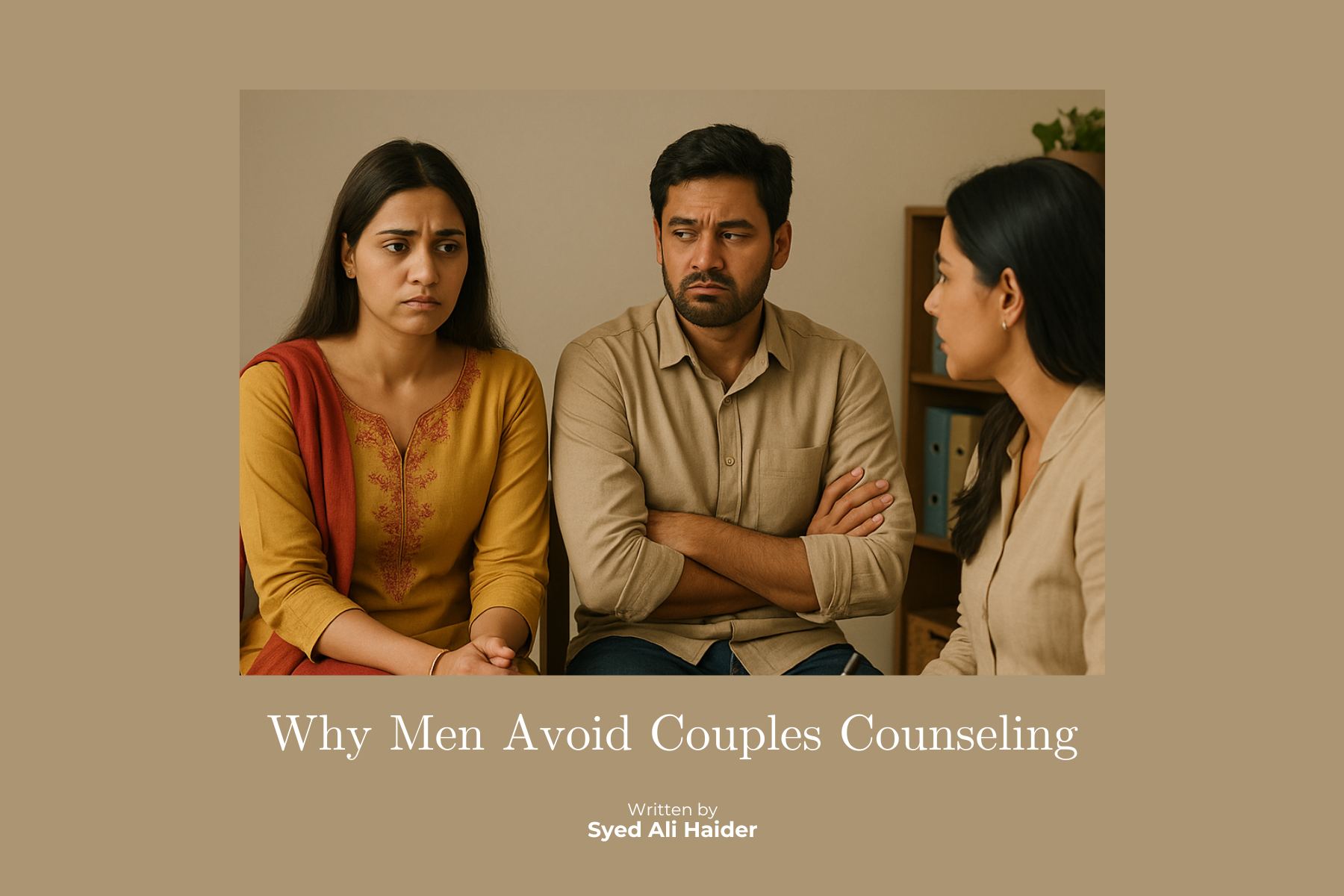Why Men Avoid Couples Counseling
Introduction
When we talk about healing relationships, one truth always stands out—women are usually the first ones to take the step toward couples counseling. They are the ones who convince, who plead, and who make the effort to bring their partners to therapy. But why is it so difficult for men to sit in a room with a neutral guide who can help resolve conflicts? Why do so many men hesitate, resist, or outright refuse counseling?
The answer lies not in lack of love, but in ego, fragile masculinity, and a deep fear of surrender.
In this blog, we will uncover the hidden reasons why men avoid couples counseling, how this affects relationships, and why letting go of ego may be the most powerful step toward healing.
Why Men Resist Couples Counseling
The number one reason men hesitate is the feeling of Surrender.
-
To men, counseling feels like giving up control.
-
It feels like admitting, “Something is wrong.”
-
It feels like exposing weaknesses they’ve been taught to hide.
This resistance is not always conscious. Many men grow up in cultures that teach them: “Men don’t cry. Men don’t ask for help. Men fix things on their own.” So when counseling is suggested, it clashes with everything they’ve been conditioned to believe about masculinity.
The Silent Efforts of Women
In my practice as a relationship coach, I’ve seen countless women walk into my office with hesitation in their eyes. They often whisper:
“Please talk to my husband gently. It took me so much effort to convince him to come here.”
Women often recognize the cracks in relationships earlier. They sense the emotional distance, the lack of intimacy, the repeated arguments. They understand that patterns don’t magically heal on their own. And so, they take on the burden of convincing their partner that help is needed.
But why should women carry this burden alone? Why can’t men step forward and acknowledge when something is broken?
The Hamster Wheel of Conflict
Relationships stuck in conflict are like a hamster wheel—you keep running, but you go nowhere. The arguments feel endless, the patterns repeat, and the pain continues.
Couples counseling offers an escape from this cycle. A therapist extends a hand and says: “Let me help you step off this wheel.”
Yet, many men swat that hand away. Not because they don’t want love to work—but because they don’t want to admit they need help.
The Real Issue: Ego and Fragile Masculinity
At the heart of men’s resistance is not therapy itself, but what therapy represents:
-
Surrendering ego
-
Admitting vulnerability
-
Risking the possibility of being wrong
Society teaches men that masculinity equals strength, control, and pride. Admitting that you need help feels like cracking that image. But here’s the truth: refusing help doesn’t make you strong—it makes you stuck.
In fact, it takes far greater strength to say: “I don’t know how to fix this alone. I need direction.”
Common Excuses Men Give
When women bring up counseling, men often respond with:
-
“I’m not crazy.”
-
“Nothing is wrong with me.”
-
“We’ll figure it out on our own.”
-
“Why involve a stranger in our personal life?”
These excuses come from a place of fear and misunderstanding. Couples counseling is not about labeling someone as broken—it’s about giving both partners the tools to reconnect, communicate, and rebuild.
Therapy is Not About Being “Crazy”
One of the biggest misconceptions is that therapy is only for people with mental illness. In reality, couples counseling is about:
-
Gaining new communication tools
-
Understanding emotional needs
-
Breaking toxic patterns
-
Learning conflict resolution
-
Rebuilding intimacy and trust
Therapy is not about fixing a “broken” person—it’s about fixing the broken dynamics between two people.
Why Women See the Need First
Women often sense emotional disconnect more acutely. They notice when conversations lack depth, when arguments keep repeating, and when intimacy fades. They push for counseling because they value emotional connection.
But relationships are not the sole responsibility of women. Healing requires both partners to step forward, not just one.
The First Step: Surrendering Ego
Healing begins when men surrender their ego. But surrendering does not mean losing power—it means choosing growth.
-
It means putting love above pride.
-
It means choosing connection over control.
-
It means replacing the wall of silence with a bridge of communication.
True masculinity is not about never bending—it’s about having the courage to evolve.
Real-Life Examples
-
A couple I worked with had been married for 12 years. The wife convinced her husband to come to therapy after years of repeated arguments. In the beginning, he sat with folded arms, resistant to every suggestion. But over time, he realized that therapy wasn’t about blaming him—it was about giving both of them new tools. Today, they communicate better than ever.
-
Another man told me: “I thought therapy meant admitting I failed as a husband. But now I see it’s the opposite. Therapy gave me the tools I needed to succeed as a partner.”
These stories highlight that the real battle is not between husband and wife—it’s between ego and healing.
The Cost of Avoiding Help
When men refuse counseling, relationships often pay the price:
-
Resentment builds
-
Emotional intimacy fades
-
Children grow up witnessing toxic patterns
-
Love slowly turns into survival
By the time some couples seek help, the damage is already deep. That’s why early intervention is key.
How Men Can Shift Their Mindset
-
See counseling as coaching, not weakness – Just like athletes need coaches, couples need guides.
-
Focus on the relationship, not blame – Therapy is not about who’s right or wrong, but about how to reconnect.
-
Understand surrender as strength – Letting go of ego is not losing—it’s choosing love over pride.
-
Practice openness – Share feelings, even if it feels uncomfortable.
-
Value prevention over cure – Don’t wait for a relationship to collapse before seeking help.
The Role of Culture in Men’s Hesitation
In many cultures, men are taught to suppress emotions. Phrases like “mard ko dard nahi hota” or “be a man” reinforce the idea that vulnerability equals weakness. This cultural conditioning becomes a major barrier to seeking help.
Changing this mindset requires redefining masculinity. A real man is not one who hides pain, but one who heals it.
Couples Counseling as a Safe Space
A good counselor does not take sides. They don’t blame or shame. Instead, they create a safe, neutral space where both partners can:
-
Express their emotions honestly
-
Be heard without judgment
-
Understand each other’s needs
-
Learn tools to move forward
When men realize therapy is not about being attacked, but about being supported, resistance begins to fade.
Final Thoughts
Relationships don’t heal through silence. They heal when both partners have the courage to admit, “We need help.”
If you feel like your relationship is stuck on a hamster wheel of endless conflicts, maybe it’s time to stop running. Maybe it’s time to let someone guide you off the wheel.
My name is Haider, and I am a Relationship Coach. If you find yourself repeating the same fights, feeling distant from your partner, or struggling to move forward, talk to me. Together, we can break free from the cycle, rebuild intimacy, and create the relationship you truly deserve.





6 Comments
Goldie Bhargava
Sir .. both my husband n myself are looking for a couple counselling but do I think before we do the session together we do individual sessions with u ??pls advise
Heart2Heart
That’s actually a really good idea. I usually suggest starting with individual sessions first so both of you can share your side openly and get some clarity before we sit together as a couple.
It really helps make the joint session more productive and comfortable for both.
Once we’ve done one individual session each, we can plan a couple session afterward.
To book your Session Visit: https://heart2heartwithsyedalihaider.com/book-appointment-with-syed-ali-haider/
Ameera
Your words light up paths and change life,,
Heart2Heart
Thank you
Ameera
Your words light up paths and change life ,,
Heart2Heart
Thank you !